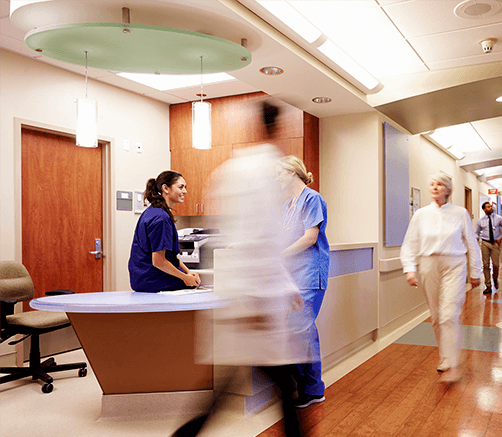People in Worcestershire can now refer themselves directly to a midwife to start their antenatal care as soon as they find out they are pregnant.
A new online self-referral form puts those who are pregnant in direct contact with midwives at Worcestershire Acute Hospitals NHS Trust, so their care planning can start as soon as possible.
Justine Jeffrey, Director of Midwifery at the Trust, said: “If you are having a baby you should start your antenatal care as soon as possible once you know you’re pregnant to make sure that you are informed about the recommended antenatal care.
“The new self-referral form means there is no need to contact a GP to or call a maternity hub to access maternity care anymore. Instead, the form can be filled in online, which is quick, easy and available 24 hours a day.
“This gives us all the information we need to start pregnancy care planning in one place, at the push of a button.”
Every year around 5,000 babies are born at Worcestershire Royal Hospital which means that every month, more than 400 people begin their pregnancy care.
Justine added: “The earlier someone tells us that they are pregnant, the earlier we can engage with them on their pregnancy journey.
“We’re pleased to have worked together with our Maternity and Neonatal Voices Partnership (MNVP) to ensure those who use our service have been involved in this new development.”
The self-referral form is available at: www.worcsacute.nhs.uk/pregnant
For more information about maternity services at Worcestershire Acute Hospitals NHS Trust go to: www.worcsacute.nhs.uk/maternity
Parents-to-be, along with their families and friends, are being reminded that baby movements matter in pregnancy.
Herefordshire and Worcestershire Local Maternity and Neonatal System (LMNS) #MovementsMatter campaign aims to encourage those who are – or those who know someone who is - expecting a baby to pick up the phone to their maternity team if they have any concerns at all about their baby’s movements.
A baby starts to move between around 16 to 24 weeks of pregnancy
Rachel Duckett, Obstetric Lead at the LMNS, said: “Once your baby starts to move, it should keep on moving. You should start to recognise a pattern and it shouldn’t stop. If the movement stops, slows down, or changes - or you’re worried for any reason, pick up the phone and call Maternity Triage immediately.”
Justine Jeffery, Director of Midwifery at Worcestershire Acute Hospitals NHS Trust, said: “We hear from some service users that they don’t want to bother us or be a nuisance – but our message is clear - don’t keep your worries to yourself. We’d much rather you called Maternity Triage to get checked. For those who know someone who is pregnant, the message is the same – please urge them to call us if they have any concern whatsoever. ”
Amie Symes, Associate Director of Midwifery at Wye Valley NHS Trust, added: “We’re also using the campaign to raise awareness that home Doppler tests (handheld baby heart monitors designed to help hear a baby's heartbeat) are not reliable. Even if you detect a heartbeat it doesn’t mean your baby is well. So - if your baby’s movements change, call Maternity Triage.”
Rebecca Stuart and Purva Shrivastava, Chairs of the two counties’ Maternity and Neonatal Voices Partnerships, said: “As parents and maternity service users, we’ve been pleased to work with our maternity teams to develop this campaign which we hope will remind those who are pregnant to take notice of their baby’s movements and really drive home the message to them, along with their families and friends, that if they have any concerns at all to pick up the phone and get help and support from the professionals at the earliest opportunity.”
For more information and advice on the campaign and associated support visit www.hwics.org.uk/movementsmatter
The phone number for Maternity Triage at Worcestershire Royal Hospital is 01905 733196.
The phone number for Maternity Triage at County Hospital, Hereford is 07990 986517.

New parents and parents to be across Herefordshire and Worcestershire now have free access to a parenting and breastfeeding support app providing practical and emotional support as well as interactive technology to help their journey into parenthood.
Herefordshire and Worcestershire Local Maternity and Neonatal System (LMNS) has teamed up with Anya – a parenting and breastfeeding app which is available 24/7 to provide parents with evidence based information and expertise – following a successful pilot project which saw more than 600 people across the two counties already download the app.
Hayley Durnall, Director of Herefordshire and Worcestershire LMNS said: “We are delighted to be able to offer all parents to be and new parents up to 12 months after birth the opportunity to access Anya for free. The pilot roll out was really successful, with great feedback about how helpful and supportive it has been for those who have downloaded it.”
Anya uses pioneering 3D and Artificial Intelligence (AI) technology to support breastfeeding and the early parenthood journey and has been developed and designed to give parents support, knowledge, comfort and the community needed to parent and feed successfully.
Zoe Durall, Lead Midwife at the LMNS, added: “Specialists are available to listen and signpost to extra help, there are virtual communities to join and share questions, and a 3D animation tool called LatchAid which uses cutting edge interactive technology to help with feeding skills.
“The app complements the support our new parents already receive from their midwives and wider maternity teams throughout their pregnancy journey and beyond.”
For more information and to download the app visit www.anya.health/hereford-worcester/
The latest edition of the Birthways newsletter is out now!
Including:
- 'Anya' on hand for top parenting and feeding advice
- Successful pelvic health service set to stay
- Meet our new LMNS Director, Hayley
- Spotlight on Worcestershire Maternity Voices Partnership
- Equity and Equality at the heart of LMNS work
The 7th edition of the Birthways newsletter is available now. Including:
- Free app to support improved pelvic health
- New service offers Beacon of health to those with mental health difficulties
- Digital developments to continue to transform care for women and babies
- Welcome to Rachel and Fiona - the newest members of the LMNS team
- Maternity and Neonatal Insight - April to September 2022

Pregnant and postnatal women in Herefordshire and Worcestershire are being encouraged to use a new workout programme to help improve their pelvic floor health.
The ‘Squeeze, Lift, Hold’ campaign has been launched by the Herefordshire and Worcestershire Local Maternity and Neonatal System (LMNS). The campaign includes a website with facts, tips and advice to help women recognise the signs of incontinence, as well as behaviours to follow to help strengthen their pelvic floor muscles.
More than one in three women experience unintentional (involuntary) loss of urine (urinary incontinence) in the second and third trimesters of pregnancy, while about one in three leak urine in the first three months after giving birth. But the team at LMNS want women to know it doesn’t have to be this way.
Rhiannon Eling, Maternity Voices Partnership representative said: “Incontinence during or after pregnancy isn’t normal and can have a massive impact on a woman’s quality of life. Talking about it isn’t normal either but it should be, which is why we’ve launched the ‘Squeeze, Lift, Hold’ campaign.
“By providing women with easy-to-follow tips and a workout programme of simple exercises taking less than six minutes each day, we hope they can improve their pelvic floor in just a few months, all from the comfort of their own home.”
The workout programme features simple, quick and effective exercises that can be fitted in around busy routines. With three stages, it is designed to improve bladder and bowel control, reduce the risk of pelvic organ prolapse, improve recovery from childbirth, preserve and/or increase sexual sensation, as well as maintain spine and pelvis support along with deep abdominal (tummy) and back muscles.
Daniela Long and Jen Westley, Specialist Pelvic Health Physiotherapists said: “Pelvic floor muscles work in two ways – slow and gently to keep things in place during your everyday life and quickly and strongly when you do a quick movement such as a cough, sneeze or laugh. That is why our workout exercises the pelvic floor in two ways – slow, gentle squeezes to work on the endurance of the muscles and then some quick, strong squeezes to stimulate both these pelvic floor functions.
“Once you grasp the technique, you can quickly start to progress and use the exercises in day-to-day activities.”
Amanda Argyle, Perinatal Pelvic Health Midwife added: “We hope women will find the workout programme simple, engaging and that they will quickly feel the benefits of adding them into their daily routines. Strengthening their pelvic floor muscles will enable them to enjoy this exciting new chapter in their lives with confidence.”
To find out more visit www.
Mums-to-be and their partners across Herefordshire and Worcestershire can now have guided tours of their local maternity services from the comfort of their own home, thanks to a series of new videos.
Informative virtual tours of the neonatal intensive care units (NICU) and postnatal wards at both Hereford County Hospital and Worcestershire Royal Hospital are now available.
It is hoped the videos will help to familiarise parents-to-be with both areas, provide information and advice around how to access the departments and what to expect if admitted, and reduce any anxieties that they may be feeling before their baby is born.
Hazel Brookes, quality improvement midwife at Herefordshire and Worcestershire Local Maternity and Neonatal System (LMNS), said: “We hope that these new videos will provide information as well as reassurance to parents to be who might have questions and anxieties around what it might be like in hospital following the birth of their baby.
“By being able to ‘visit’ the neonatal and postnatal areas of their local hospitals in advance, we aim to reassure them that friendly staff are on hand to provide safe, quality care to them and their baby, and give an insight into what the ward or area they or their baby will be staying in is like, including practical information like how to locate it, what the daily routines are like and when partners can visit.”
The videos are available via the maternity and neonatal pages on both Trust’s websites at: www.


